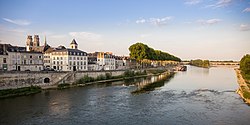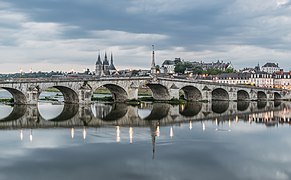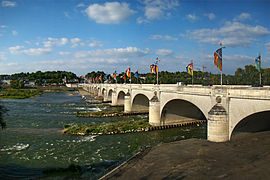Centre-Val de Loire
Centre-Val de Loire | |
|---|---|
 | |
 | |
| Country | |
| Prefecture | Orléans |
| Departments | 6
|
| Government | |
| • President of the Regional Council | François Bonneau (PS) |
| Area | |
• Total | 39,151 km2 (15,116 sq mi) |
| • Rank | 7th |
| Population (2021)[1] | |
• Total | 2,573,303 |
| • Density | 66/km2 (170/sq mi) |
| GDP | |
| • Total | €78.343 billion |
| • Per capita | €30,500 |
| Time zone | UTC+01:00 (CET) |
| • Summer (DST) | UTC+02:00 (CEST) |
| ISO 3166 code | FR-CVL |
| NUTS Region | FR2 |
| Largest city | Tours |
| Website | www |
Centre-Val de Loire (/ˌvæl də ˈlwɑːr, ˌvɑːl-/; French pronunciation: [sɑ̃tʁə val də lwaʁ],[Notes 1] lit. 'Centre-Loire Valley') or Centre Region (French: région Centre, [ʁeʒjɔ̃ sɑ̃tʁ]), as it was known until 2015, is one of the eighteen administrative regions of France. It straddles the middle Loire Valley in the interior of the country, with a population of 2,572,853 as of 2018. Its prefecture is Orléans, and its largest city is Tours.
Naming and etymology

Like many current regions of France, the region of Centre-Val de Loire was created from parts of historical provinces: Touraine, Orléanais and Berry. First, the name Centre was chosen by the government purely on the basis of geography, in reference to its location in northwest-central France (the central part of the original French language area).
However, the Centre region is not situated in the geographical centre of France (except the Cher department). The name was criticised as being too dull and nondescript.[citation needed] Proposed names for the region included Val de Loire after the Loire Valley (the main feature of the region) or Cœur de Loire (Heart of Loire).[citation needed] On 17 January 2015, as part of the reorganisation of French regions, the region's official name was changed to Centre-Val de Loire.[3] Val de Loire is associated with positive images of the Loire Valley, such as the châteaux, the gentle and refined lifestyle, wine, as well as the mild and temperate climate, all of which attract many tourists to the region. A new logo was also created.
Geography

Bordering six other regions, Centre-Val-de-Loire borders most of the eighteen regions in France. The adjacent regions are Normandy to the northwest, Île-de-France to the northeast, Bourgogne-Franche-Comté to the east, Auvergne-Rhône-Alpes to the southeast, Nouvelle-Aquitaine to the southwest and Pays de la Loire to the west.
Departments
Centre-Val de Loire comprises six departments: Cher, Eure-et-Loir, Indre, Indre-et-Loire, Loir-et-Cher, and Loiret.
Largest cities
- Tours with 136,463 inhabitants (2018)
- Orléans with 116,238 inhabitants (2018)
- Bourges with 64,668 inhabitants (2018)
- Blois with 45,871 inhabitants (2018)
- Châteauroux with 43,442 inhabitants (2018)
- Chartres with 38,426 inhabitants (2018)
- Joué-lès-Tours with 38,250 inhabitants (2018), Tours Métropole Val de Loire
- Dreux with 30,664 inhabitants (2018)
- Vierzon with 25,725 inhabitants (2018)
- Olivet with 22,168 inhabitants (2018), Orléans Métropole
Economy

The gross domestic product (GDP) of the region was 72.4 billion euros in 2018, accounting for 3.1% of French economic output. GDP per capita adjusted for purchasing power was 25,200 euros or 84% of the EU27 average in the same year. The GDP per employee was 99% of the EU average.[4]
An economic development agency, called Centréco, was created in 1994 by the Regional Council of Centre to promote the inflow of investments and the establishment of new businesses by French and foreign companies in the Centre region. This contributes to a mission of economic promotion, international support to regional companies, and the promotion of regional agrofood products via a regional signature, du Centre.
Gallery
See also
- Apremont-sur-Allier
- Gargilesse-Dampierre
- Lavardin
- Montrésor
- Saint-Benoît-du-Sault
- Corroirie
- Louroux Priory
- Beaujardin
Notes
References
- ^ "Téléchargement du fichier d'ensemble des populations légales en 2021" (in French). The National Institute of Statistics and Economic Studies. 28 December 2023.
- ^ "EU regions by GDP, Eurostat". Retrieved 18 September 2023.
- ^ "Journal officiel of 17 January 2015". Légifrance (in French). 2015-01-17. Retrieved 2015-03-10.
- ^ "Regional GDP per capita ranged from 30% to 263% of the EU average in 2018". Eurostat. Archived from the original on 2020-04-17.
External links
![]() Media related to Centre-Val de Loire at Wikimedia Commons
Media related to Centre-Val de Loire at Wikimedia Commons
- Official website
- Centre : on the road of the châteaux - Official French website (in English)
- Website of the agency for promotion and economic development of the Centre / Loire Valley region
- About-France - overview of the region and main attractions
- Experience Loire - information on the region and its departments








